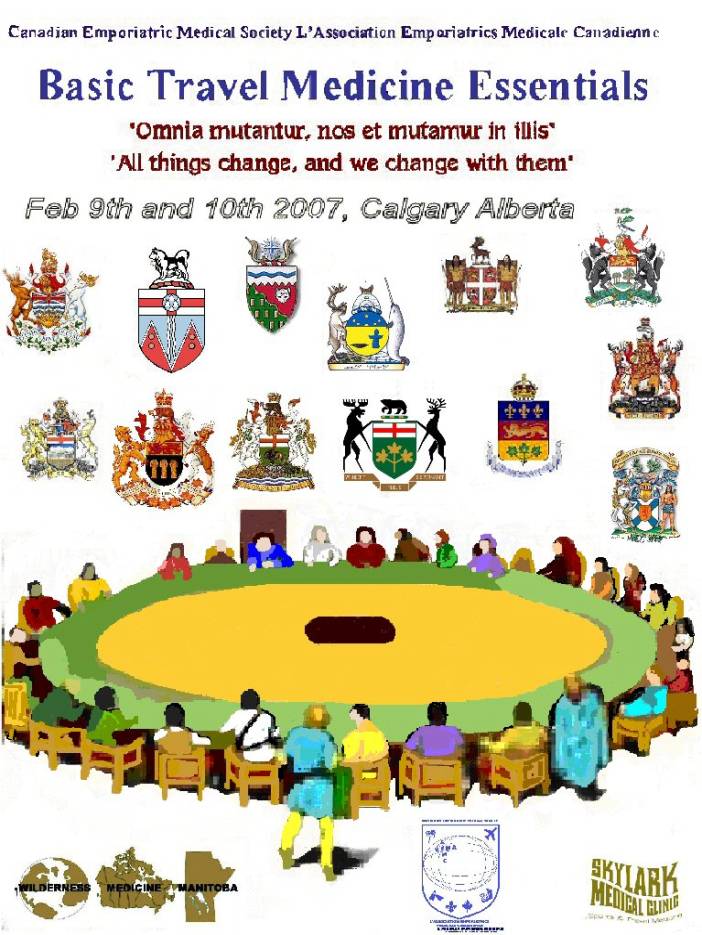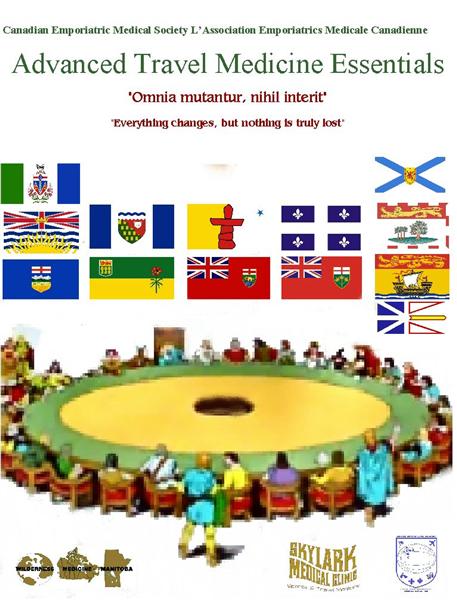|

Review
course in travel and Tropical Medicine
We
are planning an
upcoming review course we are creating for Canadian Physicians and
Nurses in Travel Medicine.
The
International Society of Travel Medicine
(ISTM) is the principle organization for travel medicine and
sets up a Certificate exam every 2 years. Their meeting is held
in North America every 4 years and this time it will be in Vancouver
May 20-24,2007. They will run their certificate examination prior
to the general meeting.
I
and my colleagues have put together a review course to enable Canadian
practitioners to study and pass this examination.
This review course is based on the published “Body of Knowledge”
important to practice Travel medicine outlined by the ISTM but is
independent of the exam and ISTM
.
Our
goal is to review basic and advanced topics in Travel Medicine so
that doctors new to this field of medicine can become rapidly proficient.
The
first review course will be

Basic
Travel Medicine Essentials.
Feb9-10th, 2007. Calgary, Canada. Emphasis on setting
up and running a travel medicine clinic, and offers an introduction
to travel and tropical medicine from the ISTM Body of Knowledge.
This is intended for
those new to travel medicine. Participants will be introduced
to many of the basic concepts necessary to practice travel medicine
over two days (total of 14 hours).
Travel Medicine Overview
Fitness to Fly and Aviation concerns
Principles of Safe Food
How to Run a Travel Clinic
Vaccine Preventable Diseases
Less Commonly Used Vaccines Meningitis/Childhood vaccines
Rabies/Tick Borne Encephalitis
Insect borne Diseases
Future Vaccines HPV and Varicella
Malaria
Chemo Prophylaxis
Altitude Chemoprophylaxis
Travellers Diarrhea
Review and practice exam to part 1
See
bottom of this page for course descriptions.
Lecture
descriptions:
1 Travel Medicine Overview- an introduction and
explanation of the scope of travel medicine. Resources available
to new practioners will be reviewed.
2 Vaccines Childhood vaccines
A review of basic childhood vaccines needed for Canadians. Review
of frequent oppositions and claims made by anti-vaccinations and
how to appropriately respond.
3 Travel Vaccines
A review of the common immunizations needed for travellers and administered
routinely through family medicine clinics. This review will help
new clinicians use available resources to make decisions in counselling
prospective travellers.Tuberculosis and Mantoux testing
4 Less common Travel vaccines
An approach t recommending less common vaccines – rabies,
meningitis, Japanese encephalitis and tick borne diseases.
5 Travelers Diarrhea
Counselling patients on how to avoid diarrhea associated with travel.
Preventative measures as well as early self-treatment
6.Principles of safe eating
Other food borne illnesses will be discussed as well as common strategies
to ensure safe health while eating abroad.
7.Insect Borne diseases
An overview of important preventative health strategies to communicate
to travelers exposed to tropical infections. Special emphasis on
Chaga’s Disease, Sandfly fever, Tick borne illnesses, River
blindness and other mosquito borne illnesses.
8. Malaria
Description of the importance of malaria to travelers and available
chemoprophylaxis in Canada . Emphasis on counselling travelers with
complicated itinerary.
9.Altitude Illnesses
Discussion of common altitude illnesses- Acute Mountain Sickness,
High Altitude cerebral Edema, High Altitude Pulmonary edema, and
other less known entities. Current chemoprophylaxis recommendations
for travelers.
10.Fitness to Fly
Screening prospective travelers and making recommendations for travel
in the context of pre existent medical illnesses.
11. Human Papilloma Virus
This will discuss the new vaccine Gardasil and how it may be introduced
into a family practice or travel medicine clinic. Similarly the
new vaccine Zostavax will also be discussed as details prio to its
launch become available
12. Rabies
When to recommend the vaccine and what to do if your patient is
bitten. Discussion on the vaccine and immune globulin and circumstances
on how it should properly be administered.
13 How to run a travel clinic
This discussion will cover important issues relevant to a successful
clinic- Business Plans, establishing credit for large vaccine orders,
vaccine storage, continuing education for clinicians and staff,
and marketing and advertising.
14. Review- sample examination of presented material
and summary
Contact:
Glenda Freeman at gfreeman@congressworld.ca
Registration form
The
next one is Advanced Travel Medicine
Topics. May 18-19, 2007.

Vancouver,
Canada. Course intended to supplement preparations for ISTM Certificate
of Travel Medicine examination with emphasis on lesser stressed
topics.
This session is intended
to supplement the basic course with less common topics in travel
medicine
(total of 16 hours).
Dengue Fever
Old Retired Vaccines
Chaga's disease (American sleeping
sickness)
Yellow Fever
African sleeping sickness
Cruise ships
Fish bornetoxin diseases Ciguatera/Scombroid/Shellfish diseases
Scuba (Recreational) an Introduction to Dive Medicine
Culture Shock Issues
Cholera and Vibrio
Travel Medicine Practice
Parasites in foods: Flukes and worms
Antivaccinationists
Bioterrorist Anthrax and Smallpox
Tuberculosis and Mantoux testing
Issues in Travel Medicine: ‘Sexual Tourism'
Schistosomiasis
Travel
Medicine Part 2
Advanced Course:
Module 2 Advanced Travel Medicine Topics
This session is intended to supplement the basic course with less
common topics in travel medicine (total of 16 hours).
1 Japanese Encephalitis (30 min)
A description of the Japanese encephalitis virus and the use of
the JEV vaccine for travellers
2 Dengue Fever (30min)
Description of Dengue fever, the risk to travelers and preventative
measures
3 Old Retired Vaccines (30 min)
A review on immunizations no longer used- old typhoid vaccines,
lyme disease, anthrax, rotavirus and others. This lecture will
assist clinicians in reading and interpreting older immunization
records.
4 Chaga’s disease (American
sleeping sickness) (30 min)
A description of the biology and risk of American trypanosomiasis
5African sleeping sickness (30 min)
A description of the biology and risk of African trypanosomiasis
6Yellow Fever (one hr)
A description of yellow fever. Its historic and modern importance
and its proper use. A discussion of the rules pertaining to yellow
fever clinics in Canada will be reviewed and how to set up a Yellow
fever clinic
7 Cruise ships (1 hr)
This will briefly discuss the conditions in working aboard a cruise
ship medical department and counselling prospective patients embarking
on cruises.
8 Fish borne toxin diseases (Ciguatera/Scombroid)
This will discuss different toxins associated with eating fish
and how travellers can choose fish to eat safely. at least one
hour
9 Scuba (Recreational) an Introduction
to Dive Medicine
This will describe common maladies associated with scuba diving.
Instructions for clinicians planning to start a dive medicine
practice and screen prospective divers one hour
10 Shellfish diseases (1hr)
A discussion of non cholera vibrio in shellfish
11 Culture Shock Issues (1 hr)
This discussion will examine psychological morbidity in travelers
abroad and when returned (Counter-culture shock). This will also
discuss the concerns of mefloquine and neuropsychiatric problems
abroad.
12Cholera and Vibrio (30 min)
A discussion on cholera prevention, the ongoing world pandemic
and vaccines past and present
13 Travel Medicine Practice (1 hr)
How to set up a travel medicine practice- advertising, marketing
and organizing a travel clinic.
14 Parasites in foods: Flukes and
worms (1 hr)
This will examine the risk to travelers and immigrants from countries
where the ingestion of raw fish and seafood is common.
Specific discussion of Clonorchis sinensis and Paragonimiasis
and other species.
Discussion on screening and preventative educational initiatives
will be introduced.
15 Antivaccinationists (30 min)
A discussion of the ongoing phenomenae of antivaccinationism with
an understanding of its causes and repercussions in leading to
decrease uptake in vaccination programs. A tool kit in preparing
for debates with antivaccinationists will be covered
16 Bioterrorist Anthrax and Smallpox
(60)
A discussion on general topics in bioterrorism concepts with specific
emphasis on the vaccinia virus. Review of the administration of
vaccinia and Vaccinia Immune globulin according to modern guidelines.
17 Tuberculosis and Mantoux testing
(30)
Overview of modern challenges in managing Tuberculosis in travelrs
and health care workers. Topics covered include the proper administration
and interpretation of the tuberculin skin test; comments on the
BCG vaccine and new developments in diagnosis (quantaferon).
*
18 Issues in Travel Medicine: ‘Sexual
Tourism’ (1hr)
A discussion of the phenomena of Sexual tourism and awareness
of key forces that drive this problem with emphasis on the role
of tourists participating in black and grey market activities
that support organized crime directly and indirectly
19 Schistosomiasis (1 hr)
A description of the risk of this disease in travelers and methods
to diagnose this in returned travelers
20 Review and practice exam to part
2 (1 hr)
Faculty
Trish Batchelor MD Lecturer,
Austrailia
Lori is an expierenced travel Physician and is working on the
International Society of Travel Medicine's committee on working
with the Travel Industry (TIPEC).
Trish Faurschou RN, Lecturer Alberta
Trish has worked in Travel Medicine and in Labour and Delivery.
She is currently also studying a second carreer in Law but continues
to work in Nursing and as a lecturer in Travel medicine.
David Cote MD, Lecturer Alberta
David has worked across the country in Quebec, Ontario, Albeta
and NWT. He is expierenced in Altitude Medicine. He has returned
t do a residency in Otolyngerology
Margeaux Niziol BN, Lecturer, Manitoba
Margeaux
is an Emergency Nurse and also practices Travel Medicine. She
has started to lecture and has an interest in Emergency and Envronmental
medicine.
Gary Podolsky MD , Lecturer Manitoba
Gary has worked as an Expedition , Cruise
ship and Aviation Medivac Physician. From his expiernce as a Travel
Medicine doctor he has sought out other clinicians and developed
a Medical education program to educate other physicians.
Review and practice exam to part 2
Registration
Form
www.skylarkmedicalclinic.com
Contact: Natalie Lamppu at nlamppu@congressworld.ca
By
running these two courses prior to the ISTM exam we hope to enable
as many Canadians to receive certification in this new and exciting
branch of Medicine
|




